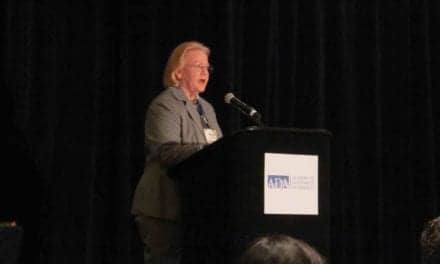Patient Management | January 2015 Hearing Review
The patient accepts information more comfortably when listening as you tell them how others have successfully solved their hearing problems. Make sure that a third- party analogy makes your point, and, as often as you can, don’t make a point without giving an interesting analogy.
Framing ideas in ways patients can easily understand positively reinforces their decision about purchasing a hearing aid.
Analogies make a good point…and a few just make good conversation. You could say, “As I look into your eyes, time stands still!” or “You have a face that could stop a clock!” Same thing, different words, entirely different meaning.
Choose Your Words Carefully
Presenting an interesting analogy is a great technique for providing important information in an easy-to-understand format. The patient accepts information more comfortably when listening as you tell them how others have successfully solved their hearing problems. Make sure that a third- party analogy makes your point, and, as often as you can, don’t make a point without giving an interesting analogy.
Depending upon where you are in your presentation, these analogies usually precede your attempt to close the sale. The words in each of these analogies have been carefully selected to make the correct point. They have been used and proven effective for many years. I recommend that you read them over and over, and say them aloud until you have them memorized verbatim. Once you have committed the stories to your memory, I’m sure you’ll find a place to use them. They have worked for me, and I’m sure they will work for you.
The “A Penny a Day” Analogy
This story explains how the hearing loss may have developed without being noticed by the non-user patient:
There was once an elderly man who had a jar of pennies on his living room table. Every day, his grandson took a penny. The loss of pennies went unnoticed until the jar was a third empty. Upon discovery, the elderly man exclaimed, “Someone took a handful of my pennies last night.” Well, of course, he didn’t lose a third of his pennies last night, even though it had seemed that way. He lost them slowly, but didn’t notice.
Well that is how you have lost your hearing—a little at a time over many years—and you probably didn’t even notice until a third of your important sense of hearing was gone.
The “Wheel of Fortune” Analogy
This story helps the hearing-impaired patient and spouse understand how the patient’s hearing loss has slowly progressed. It also explains why he/she doesn’t under- stand conversation. You start with a question: “Have you ever watched the Wheel of Fortune on TV?” They almost always say yes. Then you continue:
At first your brain is trying to figure out what sentence or phrase they’re searching for with little or no information. After a few letters are posted, you still cannot figure out the answer. As more letters are presented, or maybe the contestant buys a vowel, your brain begins to fill in the blank spaces, and as soon as you receive enough information, you understand the phrase, and then solve the puzzle.
What happened to your sense of hearing is just the opposite of the Wheel of Fortune game. When you had normal hearing, you could hear everything clearly. The complete message was received by your brain, and your brain could effortlessly decode the information so you could understand all that was being said.
As your hearing has slowly diminished, you have lost one important letter at a time, mostly high-frequency sounds, which determines the clarity of words. With the loss of these important sounds, you often don’t get enough information to your brain for you to solve the puzzle, and therefore you cannot figure out what is being said; you hear sounds loud enough, but you don’t understand the conversation! It sounds to you like people are mumbling. The higher the pitch of the voice, the more difficult it is to understand. What we need to do is to amplify those sounds you’re missing so your brain receives enough information for you to hear clearly at normal loudness and understand what is being said. Does that make sense to you?
Roy Bain has been dispensing hearing aids for over 50 years, and is the founder of Nu-Ear (now a Starkey company) and AudioCare in San Diego. Although some may not agree with his emphasis on sales, Bain is adamant that you cannot help people in this field unless you possess and hone counseling and sales skills that ultimately convince a hearing-impaired person to purchase a hearing aid and use your services. He has written two books on the subject, The Book on Dispensing Hearing Aids (2005), and Closing the Sale…for Better Hearing (2013), both published by InfoQuest. For more information, call (800) 974-4100 or email Bain at [email protected].





